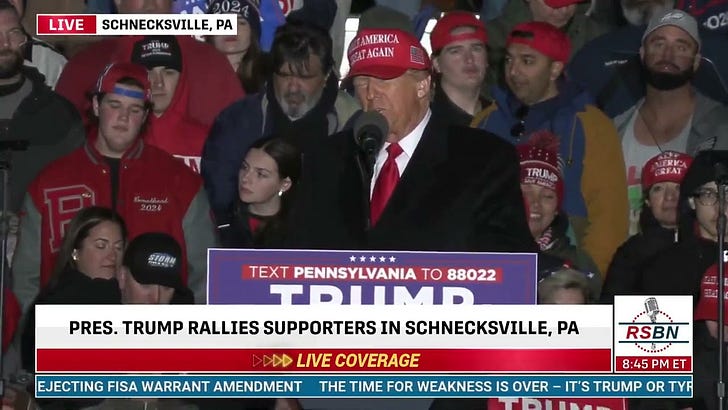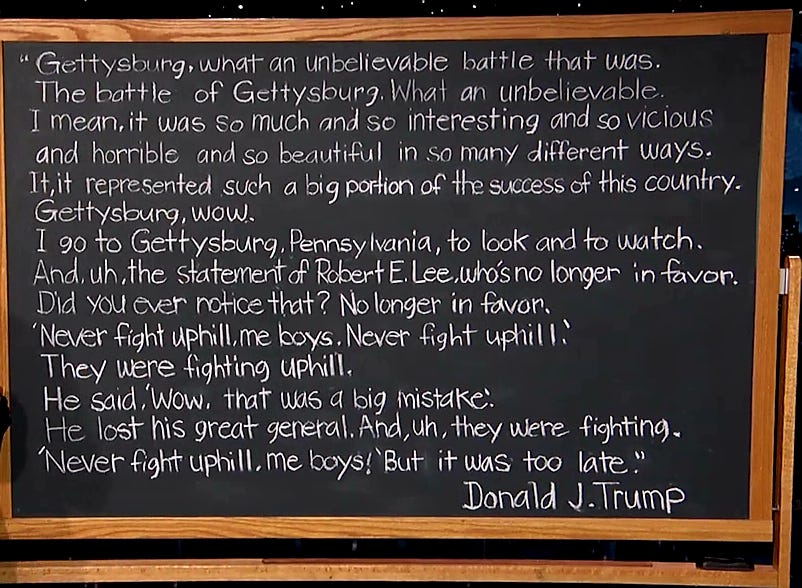"Never Fight Uphill, Me Boys. Never Fight Uphill"--Robert E. Lee at Gettysburg
A few thoughts about Donald Trump's word salad about the Battle of Gettysburg.
By now you’ve seen the clip of Donald Trump talking about the Battle of Gettysburg at a recent campaign event in Schnecksville, Pennsylvania, which is about 130 miles from the famous battlefield.
Once again, it’s an embarrassing display of ignorance about American history for this former president. Social media had some fun with Trump’s incoherent interpretation and even Jon Stewart got in on the action.
Reading the text is even more embarrassing, if that is even possible.
Just a few thought. It appears that Trump is aware that Gettysburg was a Union victory, but what I find so interesting is how quickly he pivoted to Robert E. Lee. That shouldn’t come as a surprise.
Public memory of the battle has long been framed as a battle that Lee lost rather than one that Meade and United States soldiers won. Lee’s monument looms large over Seminary Ridge as one looks out from Union positions on Cemetery Ridge. It’s hard not to believe that it was Lee’s battle to lose.
Lost in all of this is any understanding that Pennyslvania was invaded by Confederate forces in late June 1863. Hundreds of its Black residents were forced to flee in south central Pennyslvania and those that were caught were sent back south to be returned to slavery.
I don’t suspect that too many people in Trump’s audience would be worried about this aspect of the campaign even if they were aware of it. Than again, I don’t get the sense that anyone in his audience is even listening to Trump while he speaks. Just look at their faces.
But I also think that Trump’s speech is the perfect metaphor for so much of the public’s discussion about the Civil War era. It’s easy to think that this is another example of the extent to which we are ‘still fighting the Civil War,’ but really our public discourse about the war is little more than a surrogate for disagreements over larger cultural and political issues.
Debates over the display of the Confederate flag and monuments rarely have anything to do with history. At least that’s the sense I get from the many conversations and interactions I’ve had with people from across the political spectrum about these issues over the past decade.
Without having to parse his word salad about Gettysburg, I assume Trump believed that he was delivering exactly what his audience wanted to hear about the famous battle—nothing more, nothing less. It was intended not as a history lesson, but as part of a bonding experience around a shared set of political beliefs, fears, and shared grievances.






I had gotten accustomed to hitting 'mute' each time the news puts Trump clips on TV; I would have missed this latest monstrosity that KML has kindly caught and replayed.
Being an educator carries terrific burdens, apparently. I don't have the stomach to listen to that voice that combines bombastic, whiny, and gravelly.
Call me a victim (this is going to riff on Neal Katyal, who occasionally enjoys snarking on being Hindu) of my Schadenfreudian (clever Freudian pun, ja?) observing Karma's operation upon someone who merits the law's slow turn-turn-turning during the lifetimes of those he has offended.
The only thing distracting me from my obsession with Gettysburg (first visit: 68 years ago on a field trip, wearing a Cub Scout uni -- blue, natch) has been watching this guy start getting repaid for his lies about Hillary, about Ukraine, about 150 million women, about everyone.
No, I'm not monomaniacal. Perhaps bi-maniacal. The only two blogs I follow are you and Joyce Vance. Gotta go, CNN's broadcasting the Supreme Court live hearing on the almost-2nd Civil War. The one that started and was crushed on Jan 6. Thomas and Sotomayor are chopping the appellant's argument into sashimi; now Barrett and Jackson have jumped in. Great leaps forward from Roger Taney.
Gee, look at these convergences. Thanks, Kevin!
This sounds like he listened to a battlefield guide one time talk about Lee's plan to assault higher ground and then just ran with it. I don't think this is a particularly unique problem with this man, but something that visitors do all the time: hear something and then turn around and interpret it through their own imaginations. (Although you gotta admit, this guy's versions are WILD). I remember when Sarah Palin similarly mangled information about Paul Revere's ride right after getting a tour of Old North Church.
On another note: Some folks I used to hang around with commonly lamented that "no one wants to learn about the Civil War anymore because it's not politically correct," and yet never in my lifetime have I expected to wake up and find R.E.Lee on the front page of the paper. Hell, even Longstreet got a name drop on Jon Stewart last night. My old acquaintances ... their analysis of the landscape... ummmmmm